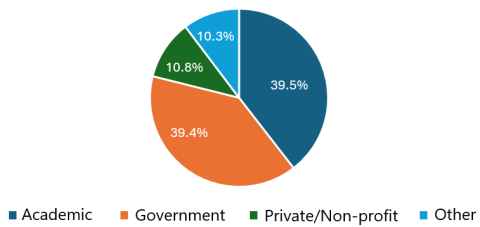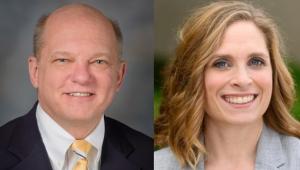Date Posted, by Jessica Faupel-Badger, Ph.D., M.P.H. & Alyssa Voss, M.P.H.
The Cancer Prevention Fellowship Program (CPFP), NCI’s distinctive postdoctoral fellowship program that combines independent, mentored research with training in translational cancer prevention science, population health, leadership, and communication, is nearing its 40th anniversary. In light of this milestone, the CPFP, led by Acting Director, Jessica Faupel-Badger, Ph.D., M.P.H., took the opportunity to re-connect with program alumni across the globe and evaluate long-term outcomes of the program.
A Program Ahead of Its Time
Percent of Alumni Respondents by Current Career Sector

Since its inception in 1987, the CPFP has been at the forefront of postdoctoral and cancer prevention research training by deliberately seeking to recruit candidates across disciplines – from the laboratory, clinical, population, and social and behavioral sciences – to apply their talents to cancer prevention research. In this way, the program has expanded the cancer prevention research workforce by recruiting post-doctoral researchers who may not have previously worked in this area and providing them with the foundation to be successful in transitioning to the field.
“The Cancer Prevention Fellowship Program has been a pioneering program since it began nearly 40 years ago, said Philip Castle, Ph.D., M.P.H., director of DCP and CPFP alumnus. “Within a few short years of NCI establishing a Division of Cancer Prevention and Control in 1983, its leaders recognized the importance of building a cross-trained multidisciplinary workforce to bring the possibility of cancer prevention to communities across the United States and the world.”
A key feature of the program is the recognition that cancer prevention scientists must be able to think strategically about where their works fits along the translational continuum from discovery to prevention and control at the population level, who their collaborators need to be to move their work forward, and both the level of evidence needed and the systemic or societal factors that influence whether an intervention will be successfully implemented in the population. To support this aim, since 1991, the CPFP has provided the opportunity for fellows to receive a Master of Public Health degree in their first year of the program.
Survey Results
The recent CPFP alumni survey, conducted in in summer 2024, sought information about their careers and the impact of the fellowship program on those outcomes. Overall, 72% of program alumni responded to the survey.
Evaluating Outcomes of the CPFP Alumni (1987-2023)
| Working in the field of cancer prevention |
Fellowship Alumni (n=181) % |
|---|---|
| None (0%) | 12.2 |
| Some (1-50%) | 38.7 |
| Majority (>51%) | 49.2 |
| Work includes research related to cancer prevention |
Fellowship Alumni (n=159) % |
| None (0%) | 9.6 |
| Some (1-50%) | 44.1 |
| Majority (>51%) | 46.3 |
Respondents currently reported careers in academia, in government, in private companies, and in other settings. Notably, nearly 90% of alumni reported working in the cancer prevention field and, of these, nearly all reported being involved in cancer prevention research. These results echo results from the 2012 program evaluation, demonstrating the long-term trends of CPFP alumni remaining in the field. Among the alumni, a variety of different disciplines were represented, including behavioral/social sciences (43%), biological/biomedical sciences (19%), epidemiology/public health (67%), medicine (13%), nutrition (15%), and mathematical/physical sciences and other (19%).
In addition, CPFP fellows were employed across 31 states and the District of Columbia, and internationally in the United Kingdom, Ireland, Canada, Germany, and South Africa. Several alumni reported working at NCI-designated Comprehensive Cancer Centers, with 15 alumni noting leadership positions in those Cancer Centers.
CPFP alumni overwhelming (80%) indicated the CPFP was extremely or very beneficial in both helping the alumni achieve their career goals and influencing their career trajectories.
Alumni Perspectives
As the survey suggests, the CPFP community remains a heartily connected group of professionals with deep affection and appreciation toward the program that helped shape their careers.
Ernest Hawk, M.D., M.P.H., vice president for Cancer Prevention and head of the division of Cancer Prevention and Population Sciences at The University of Texas MD Anderson Cancer Center, completed the CPFP after his medical oncology fellowship. He attributes his experience in the CPFP, including the opportunity to earn his M.P.H. at the Johns Hopkins Bloomberg School of Public Health, as providing the transformative shift he was seeking in his medical career. “As a medical oncologist, the treatments I was trained to provide for patients were all too often toxic and much less effective than I’d hoped they’d be. The CPFP provided me with training and tools to understand how to potentially interrupt cancer development early in people without symptoms through screening, early detection, and/or medical interception long before it becomes a symptomatic disease.”
CPFP Alumni

Ernest Hawk, M.D., M.P.H. & Krystle Kuhs, Ph.D., M.P.H.
Hawk shared that the CPFP also allowed him to forge connections with others across NCI, the Cancer Centers, and other research institutions who share the same passion in cancer prevention. “What inspires me is the idea of cancer as a preventable disease and the possibility of improving the current statistics on cancer incidence and mortality so that prevention becomes the dominant approach to the disease, just as been achieved in infectious diseases and cardiovascular disease over the last 80 years. Ultimately, my hope is that by working together on these common goals, our health care system and society more broadly, become more prevention-forward and focused on health promotion and preservation, rather than disease- and treatment-focused.”
CPFP alum Krystle Kuhs, Ph.D., M.P.H., associate professor and co-leader of the Cancer Prevention and Control Research Program at the University of Kentucky Markey Cancer Center, also heralded the program’s unique focus as what drew her in. “I had always been passionate about cancer prevention, but other postdoctoral programs I had looked into focused heavily on treatment. CPFP was, and still is, revolutionary in its commitment to cancer prevention.” As for the role the program played in her career, Kuhs said, “The CPFP changed my entire career trajectory. I went from a basic scientist developing vaccines in a laboratory to a molecular/clinical epidemiologist running large cancer screening studies. In my current role, I am able to further support cancer prevention research on a large scale across Kentucky by bringing together people, families and communities affected by cancer to enable clinical trials and studies aimed at finding better ways to detect cancer early and ultimately how to prevent it.”
For more information on the CPFP and current fellows, please visit https://prevention.cancer.gov/research-areas/networks-consortia-programs/cpfp and look for more updates on survey results and program highlights leading up to the 40th anniversary.
Other alumni in leadership positions at NCI-Designated Comprehensive Cancer Centers
- Susan T. Vadaparampil, Ph.D., M.P.H., Associate Center Director of Community Outreach, Engagement, & Equity, Moffitt Cancer Center
- Kathryn Weaver Ph.D., Associate Director of Population Science at Wake Forest Baptist Comprehensive Cancer Center
- Bernard Fuemmeler, Ph.D., M.P.H., Associate Director of Population Science at Massey Comprehensive Cancer Center
If you would like to reproduce some or all of this content, see Reuse of NCI Information for guidance about copyright and permissions. Please credit the National Cancer Institute as the source and link directly to the blog post using the original title, for example: "The NCI Cancer Prevention Fellowship Program – Developing Multidisciplinary Scientists and Expanding the Cancer Prevention Workforce was originally published by the National Cancer Institute." For questions, contact us at CancerPreventionBlog@mail.nih.gov.
